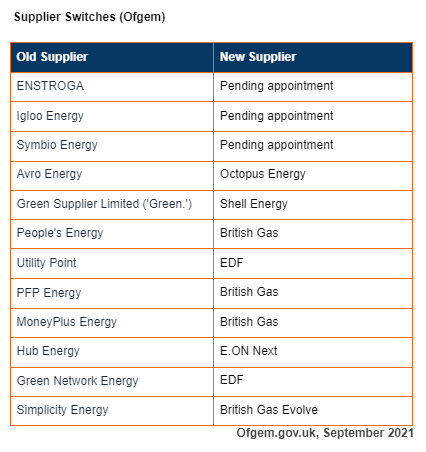UK Energy Crisis: What’s Happening?

The UK energy crisis has dominated headlines recently, but what does it all mean? and what is really going on? We’re here to help clear up the facts.
What is it?
In recent weeks a number of UK energy suppliers have gone out of business, leaving over a million customers unclear about why this has happened and what happens next.
It's being called the 'Energy Crisis', and whilst your day-to-day supply will not be affected, it is likely you will see an increase in your bills.
Why did it happen?
In the past year wholesale gas prices have been on a continuous rise (Ofgem). This has left suppliers in serious financial trouble, as regulated price caps and fixed tariffs mean they are unable to reclaim that money back from consumers. As a result, many have been forced to close down.
A number of factors have caused this high price increase. Demand for gas increased in both Europe and Asia after unusually cold winters. Stocks were then left lower in Europe which is bad news for the UK, as this is where a high percentage of the country's supply comes from.
The Government and industry regulators however, are confident that the UK's energy supply is secure and that home owners will not be affected by any shortages.
What happens next?
If your supplier was amongst those to collapse, you will automatically be switched to a new supplier and you will see no interruption to your supply.
Unfortunately, it is not a requirement for your new supplier to honour your existing tariff, so it is likely you will pay more. However, industry regulator Ofgem has confirmed that, "Customers of failed suppliers who are switched [...] are protected by the Energy Price Cap", and that any credit balance from your previous account will be protected. This ensures that even if you are put on a new tariff, the price is protected by a maximum limit.

Find the most current supplier updates here: Recent supplier exits and take-over suppliers
What you can do
Whilst it may be tempting to look for a supplier switch, you are unlikely to find any good deals in the current market. Suppliers simply can't afford new customers so their usual deals aren't available and prices won't settle again until supply issues can be resolved.
It's recommended that consumers 'wait-out' the price rise until cheaper deals return. In the meantime, there are steps you can take to ensure the energy you are paying for is being used effectively around your home.
-
Is your heating up to scratch?
Take time to check that your heaters are working – those that run cold may need bleeding and those in rooms you rarely use can be turned off.
You should also check that the heat you do have isn't escaping! If you have gaps in windows or doors, try covering them with thick curtains, draught excluders or insulation tape. -
Is your water too hot?
If your hot tap runs too hot to touch, you could save energy by turning down the water temperature. This can usually be done by a dial on the boiler.
-
How is your boiler doing?
If you find your heating is very costly, even with little use, your boiler may need replacing. Boilers that are more than 8 years old are often less than 70% efficient, compared to modern boilers that are required to be 92% efficient – that makes a huge difference to your bills.
-
Funding
If you're doing all of the above, but are still struggling with bills, take some time to research available government grants as you could be eligible for additional support.



